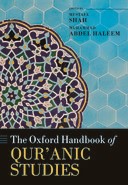 The Oxford Handbook of Qur'anic Studies
The Oxford Handbook of Qur'anic Studies
Contents
-
-
-
-
The Contents The Contents
-
Part I. The State of Qur’anic Studies Part I. The State of Qur’anic Studies
-
Part II. The Historical Setting of the Qur’an Part II. The Historical Setting of the Qur’an
-
Part III. The Qur’an: Textual Transmission, Codification, Manuscripts, Inscriptions, and Printed Editions Part III. The Qur’an: Textual Transmission, Codification, Manuscripts, Inscriptions, and Printed Editions
-
Part IV. Structural and Literary Dimensions of the Qur’an Part IV. Structural and Literary Dimensions of the Qur’an
-
Part V. Topics and Themes of the Qur’an Part V. Topics and Themes of the Qur’an
-
Part VI. The Qur’an in Context: Translation and Culture Part VI. The Qur’an in Context: Translation and Culture
-
Part VII. Qur’anic Interpretation: Scholarship and Literature of Early, Classical, and Modern Exegesis Part VII. Qur’anic Interpretation: Scholarship and Literature of Early, Classical, and Modern Exegesis
-
Part VIII. Qur’anic Exegesis: Discourses, Formats, and Hermeneutics Part VIII. Qur’anic Exegesis: Discourses, Formats, and Hermeneutics
-
-
Bibliography Bibliography
-
-
-
-
-
-
-
-
-
-
-
-
-
-
-
-
-
-
-
Introduction
Get accessMustafa Shah is Senior Lecturer in the School of Languages, Cultures and Linguistics at SOAS. His research focuses on qirāʾāt literature, hadith scholarship, classical theology, and the early Arabic linguistic tradition. He has edited a collection of articles on The Ḥadīth (Routledge, 2010) and a further work on exegesis, Tafsīr: Interpreting the Qur’ān (Routledge, 2013). He is currently editing the Oxford Handbook of Ḥadīth Studies.
-
Published:08 June 2020
Cite
Abstract
This Introduction charts the background of the scholarly engagement with the Qur’an in Early Modern Europe. Focusing on the historical importance of the emergence of academic treatments of the text in the nineteenth century and the scholarship which influenced these works, it outlines the discussions and debates which are prevalent in the study of the text and introduces the individual chapters included in this volume. While the area of Qur’anic Studies belatedly emerged from the matrix of a flourishing tradition of biblical scholarship and efforts to translate and confute the Qur’an, the constellation of topics and themes which currently feature in the study of the text underlines the qualitative nature of the advances made in the field of Qur’anic Studies.
Sign in
Personal account
- Sign in with email/username & password
- Get email alerts
- Save searches
- Purchase content
- Activate your purchase/trial code
- Add your ORCID iD
Purchase
Our books are available by subscription or purchase to libraries and institutions.
Purchasing information| Month: | Total Views: |
|---|---|
| October 2022 | 10 |
| November 2022 | 1 |
| December 2022 | 7 |
| January 2023 | 15 |
| February 2023 | 9 |
| March 2023 | 17 |
| April 2023 | 14 |
| May 2023 | 5 |
| June 2023 | 4 |
| July 2023 | 4 |
| August 2023 | 6 |
| September 2023 | 4 |
| October 2023 | 9 |
| November 2023 | 8 |
| December 2023 | 13 |
| January 2024 | 16 |
| February 2024 | 8 |
| March 2024 | 7 |
| April 2024 | 3 |
| May 2024 | 8 |
| June 2024 | 9 |
| July 2024 | 3 |
| August 2024 | 4 |
| September 2024 | 3 |
| October 2024 | 9 |
| December 2024 | 2 |
| January 2025 | 8 |
| February 2025 | 7 |
| April 2025 | 3 |

Get help with access
Institutional access
Access to content on Oxford Academic is often provided through institutional subscriptions and purchases. If you are a member of an institution with an active account, you may be able to access content in one of the following ways:
IP based access
Typically, access is provided across an institutional network to a range of IP addresses. This authentication occurs automatically, and it is not possible to sign out of an IP authenticated account.
Sign in through your institution
Choose this option to get remote access when outside your institution. Shibboleth/Open Athens technology is used to provide single sign-on between your institution’s website and Oxford Academic.
If your institution is not listed or you cannot sign in to your institution’s website, please contact your librarian or administrator.
Sign in with a library card
Enter your library card number to sign in. If you cannot sign in, please contact your librarian.
Society Members
Society member access to a journal is achieved in one of the following ways:
Sign in through society site
Many societies offer single sign-on between the society website and Oxford Academic. If you see ‘Sign in through society site’ in the sign in pane within a journal:
If you do not have a society account or have forgotten your username or password, please contact your society.
Sign in using a personal account
Some societies use Oxford Academic personal accounts to provide access to their members. See below.
Personal account
A personal account can be used to get email alerts, save searches, purchase content, and activate subscriptions.
Some societies use Oxford Academic personal accounts to provide access to their members.
Viewing your signed in accounts
Click the account icon in the top right to:
Signed in but can't access content
Oxford Academic is home to a wide variety of products. The institutional subscription may not cover the content that you are trying to access. If you believe you should have access to that content, please contact your librarian.
Institutional account management
For librarians and administrators, your personal account also provides access to institutional account management. Here you will find options to view and activate subscriptions, manage institutional settings and access options, access usage statistics, and more.